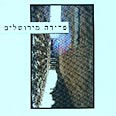
Author, playwright, poet and former Foreign Ministry employee Avigdor Dagan passed away in the early hours of Sunday morning at his home in Kiryat Moshe in Jerusalem at age 94. Dagan was survived by his wife Stella, son Daniel and brother Gabrial, also a playwright and actor.
Dagan was born in 1912 in Czechoslovakia with the given name Viktor Fischl. He studied law and political science at University in Prague where he lived until the outbreak of World War II. While he was studying he served as editor of the Jewish weekly Zidovsky Zpravy and secretary of the Jewish faction of the Czechoslovakian parliament until 1939.
After the Reich forces conquered Prague, Dagan escaped to London, where he met Czechoslovakian Ambassador Jan Masaryk, with whom he returned to Prague at the end of the war.
In 1949 he immigrated to Israel and settled into a career at the Foreign Ministry, where he served as an envoy to Japan, Burma and Yugoslavia, and was Israel’s Ambassador to Poland, Norway and Austria. He began his literary career already in his youth in Prague, where he published a number of poetry anthologies, including “Hebrew Melodies,” which earned him an important literary award in Czechoslovakia and was later translated to Hebrew.
After the war Dagan published additional poetry books in London, which dealt with the experience, among other things. “The Dead Village,” a long poem written after the Nazi invasion of Ledice and its devastation, was translated into many languages.
Banned in Czechoslovakia
His first novel, “Song of Pity,” was banned in Czechoslovakia when the communists took charge in 1948. It was translated to Hebrew in 1951.
He wrote many more books in Czech which were translated to Hebrew and other languages, including “The Court Jesters,” “The Fifth Quarter,” and “Pegasus.” He also wrote for the theater and his plays were staged in Israel.
The Holocaust was central to his work and many of his books dealt with it.















